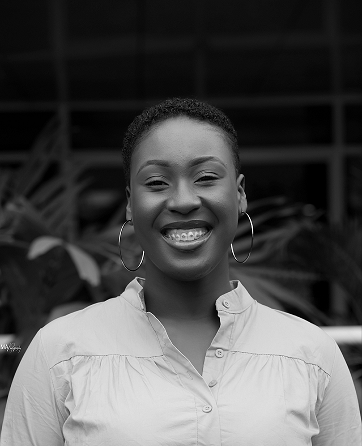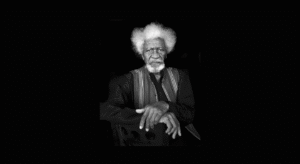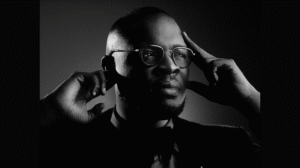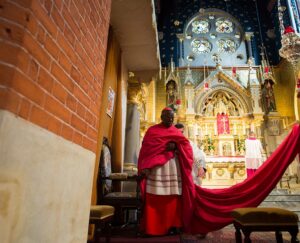In December 2018, anti-government protests over the steep cost of bread in Atbara, a city in northeastern Sudan, ignited a nationwide revolution. Hundreds of thousands of people, agitated by abysmal socio-economic conditions throughout Omar Hassan Ahmad al-Bashir’s 30-year dictatorship, filled cities across the country. Just fall, that’s all! they sang. But none rang louder than the voices of the women. The most repressed victims of Bashir’s regime, they made up over half the demonstrators. Thousands of them stood at the forefront, the undeniable heart of the needed change. Women had always played significant roles in Sudan’s past protests. But this time, with the help of social media, they sprang into the limelight, iconized in the viral photograph, Kandake of the Sudanese Revolution, of 22-year-old student Alaa Salah draped in a white thawb, standing on the top of a car, in a street in Khartoum, leading a crowd in songs.
It was a callback to the 1953 protests against British colonial rule, when hundreds of women, dressed in white thawbs, marched from Omdurman to Khartoum, chanting, Long live Sudan! The historical reference led to the women leading the protests being called kandake — an ancient Meroitic title for queens and royal mothers. In 25 B.C., one kandanke, Amanirenas, led 30,000 soldiers to repel a Roman invasion. Her achievement and those of other kandankes were immortalized on temple reliefs.
The women of the revolution knew they were building on history, building with art. They painted murals with messages; the artist Alaa Satir wrote on hers: Hey ladies, stand your ground, this is a woman’s revolution. They drew henna tattoos on their bodies and palms that read: Just fall.
Ahmad al-Bashir fell in April of 2019, to a coup d’etat. On June 3, the Transitional Military Council opened fire on unarmed protesters in Khartoum, killing over 100 people, dumping bodies in the Nile, and ending the months-long sit-in. It was a rebuff of a national dream.

Months into the protests, Leila Aboulela, the best-known contemporary writer from Sudan, embarked on a new novel in Scotland, touched by the fervor of the protesting women. It was a story of an earlier unrest. She initially set it during the aftermath of the British invasion of 1898, and began work with a fellowship at the Bellagio Rockefeller Centre in 2018. The story was to follow a young Scottish artist in Sudan who gets into trouble when his drawing of a tribal chief’s wife is discovered. But as she wrote, the woman in the drawing took center stage, and the artist was no longer the main character. The change caused a shift in focus to a more contentious time: the years leading up to the invasion. The Ottoman Empire had conquered Sudan. Foreign rule and heavy taxes left the people disillusioned. A religious leader proclaiming himself the Madhi, a redeemer promised in Islam, amassed a large following and then an army, and rose up against Turkish-Egyptian rule.
The Madhist War, which lasted for 18 years, was a subject close to Aboulela’s personal history. Her home in Khartoum was only four kilometers away from the palace on the Blue Nile where Charles Gordon, the British governor-general of Sudan, stood on the roof with a telescope during the siege of 1884 and waited for rescue by a British relief force. Her Egyptian great-grandfather, an immigrant in Sudan, was opposed to the Mahdist cause, and hid his five daughters in a pit to keep them safe when the army advanced into Omdurman.
So as Aboulela watched the fierce revolutionaries of her own time, she reached into the annals of history to find women in the 1890s and found there were not many documented. She did not come across a single account of the war from the first-person perspective of a woman. Their entire presence in the war had been swept to the periphery; the few acknowledged ones were now mere footnotes, and it was up to her to bring them to life.
She created Akuany, her central character, after a visit to the Sudan Archives at Durham University. There, she found a 19th century bill of sale for a domestic slave, complete with sum of money paid and names of parties involved. She had always known of slavery in Sudan, and people who were descendants of the enslaved, but to see such tangible proof felt different. She also found a petition: an enslaved girl named Zamzam had stolen a piece of clothing from her mistress and fled to her former master, against whom the petition was made. She was fascinated.
“Of course, knowing that her real name wouldn’t have been Zamzam, it was her Arab slave name, and that she would have had an African name,” she explained. “So, I kind of went backwards with that and said, how did she acquire that name, and what was her first name?”
She looked into East African slavery to know what life was like for someone like Zamzam. She read The Slave Yards by Najwa Binshatwan and Segu by Maryse Conde. She was inspired when she saw that Ayesha Harruna Attah’s The Hundred Wells of Salaga is set in the same time as hers. “It was like trying to immerse myself in this ocean of different influences,” she said.
For other women characters, she relied on minor mentions in the records. If she read that a woman provided intelligence by spying, she used it and made a character go inside a British engineer’s house to get information, and then pass it on to another woman selling groundnuts near the ferry. She made her women journey with the Madhist army and engage in espionage. She gave them full arcs — a slave girl’s precarious coming-of-age, a woman whose bravery and sacrifice changes the tide of the war, a Northern woman’s inspiring sense of agency.

Through the eyes of seven different characters, River Spirit coalesced into a story of a people struggling for independence. When Akuany’s father is killed by raiders and their village destroyed, Yaseen, a young merchant from Khartoum, vows to protect the young girl and her brother. He takes them north to Al-Ubayyid, where she is sold into slavery and given the name Zamzam. As her childhood into adulthood is upheaved by war, her life remains intertwined with Yaseen’s, who becomes a jurist and, despite consequences, refuses to embrace the Madhi. Alongside them are a zealot fiercely loyal to the Madhi cause, a Scottish engineer and painter, and Yaseen’s mother. Drawn with meticulous character work, their relationships are uneclipsed by the scope of Aboulela’s historical backdrop and thrilling plot.
River Spirit is a story of love, faith, and the conflicting legacy of a false messiah’s stand against imperialism. When it came out in March from Saqi Books, Abdulrazak Gurnah praised its “extraordinary sympathy and insight.” Last week, The New York Times named it one of the 10 Best Historical Fiction Books of 2023.
The novel is yet another project in which Aboulela animates Sudanese women as varied, complex individuals. “I started the novel very much inspired by this idea of Sudan’s women as being very strong characters,” she said. Her country’s women have always been in the foreground of her work, gaining shape from her own experiences. “I find women interesting,” she added. “And I guess that’s why I write about them. I find that their lives are interesting.”
Aboulela was raised by a high-achieving woman: her Egyptian mother, a professor and the first demographer in Sudan, with a Ph.D. from London. Her father, a Sudanese businessman, came from a respectable family. Although they were both Muslims, her parents had a fairly liberal outlook on culture and religion. For her primary education, she attended the Khartoum American School, which she recalls had “very few Sudanese pupils and no Sudanese teachers.” She went to Sisters’ School, a private Catholic high school and one of the best in Khartoum. Her parents, who had Christian friends themselves, would not object when she accompanied her Ethiopian nanny to light candles at church.
Her childhood was marked with summers with her mother’s family in Cairo. In Khartoum, she learned Sudanese culture from her father’s side, but they ate Egyptian food at home and had Egyptian friends. A multicultural upbringing was not without its troubles. While both households were Arab, African, and Muslim, and marriages between them common, she was teased by her schoolmates and father’s relatives for speaking Egyptian colloquial Arabic like her mother. Shy and bookish, feeling Sudanese but not speaking like one, she turned inward.
“Among Egyptians, I [also] felt like a fraud,” she has said. “I think that this was one of the reasons why I gravitated towards expressing myself in English. It was a third language, refreshingly free from the disloyalty of having to choose between my father and my mother’s tongues.” Later, she would say that being an outsider “is good for a writer.”
After receiving an Economics degree from the University of Khartoum, she, following in her mother’s steps, left to pursue a doctorate in Statistics at the London School of Economics, but settled for an M.Sc. and M.Phil. instead. Although she did well in Mathematics, it was history that she always wanted to study, even though she got poor grades in the subject.
It was at this time, as a young, married, new mother, that she began to don the hijab. She had always prided in her faith. Her grandmother and mother, women who worked and studied and taught, showed her an intimacy to religion beyond common conceptions about what it meant to be a Muslim woman. Yet a Westernized upbringing meant she did not feel free to wear the hijab in Sudan. London offered obscurity, which she embraced; her husband, a Sudanese British oil engineer, was away at work, and she did not like the way men made advances, so she stuck to her hijab to create a distance with the men, then carried on wearing it because she liked it.
“Now, you have girls saying that the hijab is about their Muslim identity, but that’s not the real reason you wear a hijab,” she told The Independent in 2010. “The real reason is to do with spirituality, and modesty, and how the Quran views relationships between men and women.”
Spirituality would become an inextricable part of her work. Although her own faith informed this, it also stemmed from her unsuccessful attempt to get a Ph.D. She’d learned from the process that a dissertation should raise fresh approaches in its subject, and she applied that to her writing.
She said to The Markaz Review, “I resolved to add Islam to literature written in English, to push the boundaries because the faith was not there — at least not explicitly. In this way, I would be bringing something new to English literature. So, I set out to write in the tradition of post-colonial African literature with a focus on the Muslim experience.”
As a child, she’d read A Wrinkle in Time, Little Women, and The Diary of Anne Frank. In her teenage years, Naguib Mahfouz, Tayeb Salih, and the Russian classics. She was 28, and in Aberdeen, when she felt she had no choice but to start writing. But she was never attracted to the idea of being a writer; her early writing caused her disturbance. “I was like someone possessed,” she told World Literature Today in 2020.
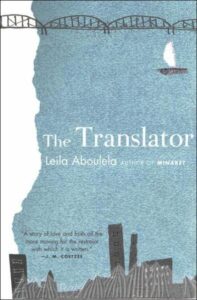
A mother of two boys — aged six and two — newly settled in Aberdeen and saddled with feelings of exile, she was terribly homesick. Her husband worked off-shore on the North Sea oil-rigs. She missed Khartoum deeply. She worried about raising her boys in cold, gray Scotland. Jarred by a strange place so unlike home, and surrounded by anti-Islam and anti-Arab sentiments given the media coverage of the Gulf War, an urgency to write followed: the only way she saw to address her feelings. Initially, she attempted writing articles, but came to affinity for fiction, and signed up for creative writing classes at the Aberdeen Central Library. There, she met Todd McEwan, then a writer-in-residence there. Encouraged by the response to her work, she began to send out her stories to be published.
That difficult period resulted in her first book, The Translator, in 1999. The novel follows Sammar, a grief-ridden Sudanese widow living in Scotland, who begins to open up to romance with the Scottish professor for whom she translates Arabic. But their love story skids to an inevitable impasse in the face of her religious devotion: Rae is agnostic, but to be with her, he must convert to Islam. J.M. Coetzee called The Translator “all the more moving for the restraint with which it is written.” It was longlisted for the Women’s Prize for Fiction and was named one of The New York Times’ 100 Notable Books of 2006 after its release in the United States, which made her one of only a handful of Muslim African voices published in the country.
While working on The Translator, Aboulela had visited a museum in Aberdeen, intending to use it as a setting. Disappointed with its colonialist exhibitions on Africa, she decided not to. To keep from wasting her research, she took the advice of a friend and wrote it as a separate story. It is about Shadia, a wealthy young woman from Sudan, who has come to Aberdeen to pursue a master’s in Statistics, and her relationship with a Scottish fellow grad student. Inter-cultural tensions arise between the two on a date to a museum.
“The Museum” appeared in Opening Spaces: An Anthology of Contemporary African Women’s Writing, a Heinemann collection edited by the Zimbabwean writer Yvonne Vera, and was submitted it to the newly established Caine Prize for African Writing. She received a call from the then editor of the Heinemann African Writers Series, Becky Clarke, and learned that she had been shortlisted. At the award ceremony, at the Zimbabwe Book Fair, she won, and the chair of judges Ben Okri lauded her story as “moving, gentle, ironic, quietly angry, and beautifully written.” “I remember that made me feel very happy, you know, that Ben Okri had read my story and that he had liked it,” she recalled. “It meant a great deal for me.” The Translator had been out for a year and the win gave her a career boost.
She then published Coloured Lights, a collection of eleven stories, including “The Museum,” featuring young Sudanese women and Muslim immigrants in the West as they struggle with cultural differences, religion, and a sense of displacement. The Telegraph said of the book, “Again and again [she] conveys the sense of two worlds touching and creating a further world, a new place in which it is exciting to find such a gifted writer.”
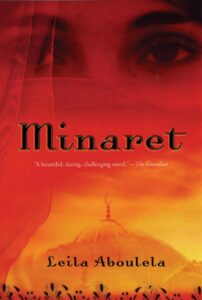
She followed it with Minaret, the story of Najwa, a privileged young woman in Sudan, who escapes to London with her mother and brother when a coup leads to her father’s execution. Wrenched from her old life, she navigates loss, life in exile, and the liberties afforded her by a secular society. She finds sustenance outside the men in her life, in faith. It is an arduous path to spiritual peace, but Aboulela traces it beautifully. Minaret, published in 2005, was longlisted for the Women’s Prize for Fiction.
“There is this sense of alienation, that there is only you and God,” she told The Guardian after the book was released. “That’s what religion teaches, that life is a temporary thing which is going to dissolve one day.”
When Aboulela returned to Khartoum in 2006, for the first time in 17 years, to tend to her ill father, she began to muse on her country’s history: how it glowed with promise after independence in 1956, the tumultuous, coup-ridden fate that followed. “I wanted to write about my father’s youth,” she said. “He grew up in the 1950s, and it was an optimistic time in Sudan’s history because it was a time of independence. But he was also very much affected by the accident that his cousin experienced. It was something that he spoke about in his last days, when he had dementia.”
Her father’s cousin, Hassan Awad Aboulela, privileged, and teeming with prospect, attended the prestigious Victoria College in Egypt, and was set to go to Cambridge University when he had a swimming accident. He dove into the water and broke his neck on a rock beneath the waves. Paralyzed, his future destroyed, he turned to poetry.
The story inspired Nur, the protagonist of her 2010 novel Lyrics Alley, only she situated the accident in the 1950s instead of a decade earlier when it actually happened. In the novel, the powerful Abuzeid family is struck by a devastating accident as changes rock their country. Set almost entirely in Sudan, it was Aboulela’s first departure from the immigrant experience. It received the Scottish Mortgage Investment Trust Book Award for Fiction, was shortlisted for the Commonwealth Writers’ Prize for Best Book (South Asia and Europe), and was longlisted for the Women’s Prize for Fiction in 2011.

She ventured into the past again in her fourth novel, 2016’s The Kindness of Enemies. The story alternates between timelines. In present-day Scotland, we follow Natasha Wilson, an accomplished half Russian, half Sudanese professor, as she researches the life of Imam Shamil, a Muslim leader of the 1800s North Caucasian rebellion against the Russian Empire. The story takes us into the mid-19th century, as Imam Shamil, after failed negotiations, sees his son kept and raised by the Russians. In turn, he captures a Georgian princess married to a commander in the tsar’s army. Aboulela was interested in Shamil fighting Jihad from a Sufi perspective, something different from how the ISIS and Al-Qaeda waged theirs in the present day. Imam Shamil didn’t fight until death; he accepted he lost the war and was exiled in Moscow.
Like with Sammar in The Translator, Aboulela uses Natasha Wilson to further explore that fraught relationship with mixed heritage. Wilson says at a point:
I was seeing in these awkward composites, my own liminal self. The two sides of me that were slammed together against their will, that refused to mix. I was a failed hybrid, made up of unalloyed selves.
She makes effort to conform to British society, shedding both her real last name and her father’s Muslim faith. When she learns one of her students is a descendant of Imam Shamil and holds his legendary sword in his home, she visits the young man and his mother, forcing her to grapple with long-skirted questions of faith and identity. By oscillating between post 9/11 Britain and the historic events of a jihad undistorted by terrorist connotations, The Kindness of Enemies confronts warped perceptions of Islam. For Aboulela, history had become a prime tool in her fiction.

Her next book put her work in perspective, collecting several stories she had written over two decades, including, for the second time, “The Museum.” The 13 stories in Elsewhere, Home — two were new and 11 previously published — are set from Khartoum and London to Abu Dhabi to Aberdeen, and chart the lives of vastly different people in the face of common struggles of migration, alienation, and longing for home. It came out in 2018 and was named the Saltire Fiction Book of the Year.
A rapturous review appeared in The New York Times, from the Iranian American novelist Porochista Khakpour:
If literary realism attempts to hold a mirror to the world, then Leila Aboulela’s Elsewhere, Home is an especially vivid reflection in a pond, as accurate as glass’s gaze but rippled to capture life as a thing shivering and fluid even when seemingly still. The force of Aboulela’s writing exceeds its representational significance. . . These intricacies of bicultural families and friendships carry a delicate strength that doesn’t just resemble life, it is life. . . What is Sudanese and what is Scottish become almost weirdly incidental in Aboulela’s consistent, confident directness. It’s high time for Aboulela to gather her accolades in this country.
A loud accolade came her way when John Freeman, who edited her at Granta, called her “one of the best short story writers alive.” She has “assembled a small body of surpassing grace,” he said. “Publishing her has been one of the highlights of my life as an editor.”

The Sudanese women in Aboulela’s fiction disarm stereotypes because they are fully formed, emotionally resonant individuals. They sometimes dare to question the limits of their cultures. They look to Islam not merely as an aspect of identity but as something core and intimate. Even as they find fortitude in their faith, they careen from personal struggles and are flawed. Aboulela shows spirituality in shades, the characters that do not share her faith woven as carefully as the ones that do. By remaining steadfast in honoring the characters, their experiences, their struggles, she rebuffs the politicization that plagues literary work engaging Islam.
“Leila liberates women in her writings,” the South Sudanese novelist Stella Gaitano, author of Edo’s Souls, told me. “I am not referring here to her liberation in the sense of freedom, but rather it gives her the right to live her full human experience without affectation. It presents each female character standing without bearing the deposits of Patriarchy authority and trying to resist it and move forward. We find in her writings that women live motivated to fight battles, and the circle of these battles expands as they move from one place to another, such as immigration, or from one situation to another, such as marriage or widowhood, and each time new fighters are guaranteed against them. But she [does] not for a moment give up her responsibility to protect her identity as a woman and as a human being.”
These characters sometimes come to life in interesting ways. Where Akuany in River Spirit sprouted from a slavery document, and Nur in Lyrics Alley came from her uncle’s accident, she wrote Shadia in “The Museum” after a young woman she saw at Aberdeen Airport. She was slim, graceful, with hair held back, and Aboulela had assumed she was a student. What draws her to a character?

“I guess what fascinates me [is] what I feel I know,” she said. “So I think, I know about this person, and that means I want to explore the character more. Or if I can imagine this situation and it makes sense to me, so I feel I can build upon it. That’s how I follow my instinct.”
That instinct for discovery is at the heart of her 2019 novel Bird Summons. Like Najwa in Minaret, the women in Bird Summons are on a search, this time literally. They take a trip to find the gravesite of Lady Evelyn Cobbold, the first British woman to perform the Hajj. Salma, married to a British convert, has secretly reconnected with an old flame from Egypt. Moni has thrown herself into care for her disabled son, to the neglect of her husband, and young, beautiful Iman reels from a third failed marriage. Aboulela gears toward the fantastical as the three Muslim women confront their fears and desires when they reach a monastery-turned-resort on the Loch Ness shore.
In an interview with The Punch Magazine, she said of Bird Summons, “I see it actually as a contemplation on the presence of Islam in Britain. How the process is coming from immigration (economic and refugee) as well as a colonial past. How women are vital in this process. And how individual human flaws and weaknesses are shaping this narrative.”

But in aiming for particularity, she is aware of how time changes how we read. Eighteen years after its first release, she told Sudanow Magazine about her first novel The Translator, “The scope of those problems has widened. I was writing with great sentiment. But if I have to write The Translator now, the matter could be more difficult.”
The writer Reem Gaafar pointed out that there are few published female Sudanese writers, which gives Aboulela’s work even more importance. “Her writing covers such a wide range of eras in Sudanese history that reading her work familiarizes the reader with the way Sudan has progressed politically and culturally,” Gaafar wrote to me. “It sheds light on the student movement in Sudan in the ‘70s and ‘80s and on the relationship between the North and South before the secession.”
Her fiction works because of her characters, Gaafar said. “Her characters come from very different times and backgrounds. The character in the beginning of the story is not the same in the end, and we see how their interactions with these different issues shape them in a way that many of us can relate to. I find that not being confined to historical fiction like many writers do makes the characters relatable. Many of us share the same experiences as these women, and this is something that we don’t find in most Sudanese literature. I believe this places Aboulela’s work in a category of its own.”
Aboulela had always believed that she knew Khartoum. But in April of this year, one month after River Spirit was published, conflict between the Sudanese Army and the paramilitary Rapid Support Forces, over the latter’s integration into the army, drove the country into conflict, and her Khartoum became a center of the carnage. Gunfire and explosions rang in the air. Corpses lay forgotten and looters ran amok. The capital’s six million populace lacked food, water, or electricity, and hospitals lacked supplies. People fled in their thousands, the closed airport sending them scrambling for other routes out of the city. By last count in July, over 10,000 people had been killed, and 4.8 million displaced.
“The thing is, we don’t know what the way out is,” Aboulela said. “If this was the 19th century, an army and outside power would have gone in and sorted things out. This isn’t going to happen now, of course. A military occupation of Sudan by a foreign power is not a solution.”
Like so many in the diaspora, she worries for her friends and family. While they have escaped the city, they face hardships in exile. She is devastated, and, in a way, alienated; she may have written of her country’s turbulent past but she has never experienced war. Longing for Khartoum all those years ago led her to write stories. Now, it is much too personal.
“I don’t feel confident that I can write about what is going on there,” she added. “I feel as if the city has just gone in a different direction. I feel I don’t know it anymore.”
Place is important to her. In a short 2012 essay, she wrote that after her family:
. . . moved to a newly-built house near the Blue Nile, our old house in Street 7 was renovated beyond recognition by its new owner, but in my mind, it remained the same down to the smallest detail.”
Physically in terms of sensations, in term of aesthetics I am rooted in Khartoum and to that particular house. . . it is my base; synonymous with a private idea of Sudan.
Her childhood home appears in her fiction. In The Translator, Aunt Mahasin lives there, and, to make up for her own inability to do the same, Aboulela made her protagonist Sammar return from Aberdeen and join her aunt there. She continued in the essay:
Physically in terms of sensations, in term of aesthetics I am rooted in Khartoum and to that particular house. . . it is my base; synonymous with a private idea of Sudan.
The fact that there had not been a war in Khartoum since the Madhi’s she depicts in River Spirit, and the fact that the ongoing war was preceded by the revolution led by women, has made the novel politically urgent.
Research for it was the most extensive she had done for a book. Even as she worked to clarify the role of women in that uprising, the big picture was murky. “I was getting conflicting narratives about this particular time in the history,” she said. Her high school syllabus had offered the Madhist history as a nationalist movement that freed Sudan from foreign oppressors, but when she read Alan Moorehead’s The White Nile, it was a pro-British take that painted the colonial governor Gordon a hero. After the Madhist siege of Khartoum and defeat of Gordon, she found, the British spun incomplete accounts of the war in order to rouse support for their invasion. The story required discernment and she sifted through biased British accounts. With her knowledge of Arabic, she accessed original, untranslated records.
“I wasn’t dependent on the colonial sources,” she said. “The British chose certain narratives to translate into English, they didn’t translate everything. So, going and reading the primary accounts in Arabic opened a lot of perspectives and a lot of angles for me. That was very useful.”
It allowed her to attempt something foundational in her historical storytelling. “It was new because it was a deeper way of looking at it, with the Sudanese perspective, rather than the Egyptian or the British perspectives,” she said. “And I’m not sure I could call it new because I knew it, but then you’re getting a richer impression of it, a deeper, more nuanced impression, so, it’s much more interesting. And, of course, being older and understanding my generation’s education, our influences, the way we were brought up to see a very Eurocentric vision of the world, I’m more critical now than I was when I was younger. I don’t accept everything that I’m reading or being told. That has also affected the way I approach the texts.”
The novel has allowed her to take on larger questions of documentation, perspective, and the politicization of African history. “What is the school syllabus saying? What is the history that’s being taught in schools in Africa? Who is writing these books? They need to be rewritten and refreshed; just because it is history doesn’t mean we’re going to read the same book decade after decade. Is there funding for research? What subjects are we looking out for? Are we still centering Europe? We seem to be, in the fiction. Most of the historical fiction I read is either centering Europe or relates to Europe’s involvement in Africa, as is the case in River Spirit. There are always fresh approaches.”

The question of a cultural centre was a lightning rod for Aboulela’s critics, who faulted her decision to write in English and not Arabic, and asked if she wrote primarily as an African or an Arab. They posited that, having lived in Dubai, Qatar, Indonesia, and Scotland, she writes about Sudan “like a tourist” and that her characters are “mouthpieces for Islam.”
She has argued that placing her characters in the West highlights issues that must be addressed. Most Muslim characters in fiction “are either fundamentalists or completely liberal,” she told The New York Times in 2014. “They never write about the people who are in the middle.”
The result is a body of work that is as European as it is African. “I see my work as an expansion of Sudanese consciousness into the wider world,” she said. “Too often Sudan has existed behind an iron curtain, detached from the outside world — not Arab enough, not African enough, in denial of its colonial relationship with Britain. My work connects Sudan to the world. English is not only a European language; it’s the language of Africa and Asia.”
For a long time, Sudanese literature, in both Arabic and English, did not make much space for a lot of female writers. Aboulela told us that she came quite late to the work of Malkat al-Dar Mohamed, the first Sudanese woman to publish a novel, in Arabic. Mohamed’s The Wide Void, about a school teacher in British-ruled Sudan and her unhappy marriage, “needed maturity to appreciate its social realism treatment,” Aboulela said. She was drawn, too, to Zeinab Bilail, whose love story The Choice explores urban migration and education in post-colonial Sudan. She built her work on theirs, as women telling stories in a male-dominated society, and went further. Fanack, a website covering North Africa and the Middle East, paraphrasing the critic Jamal Mohammed Ibrahim, wrote that “Aboulela has achieved a breakthrough for Sudanese writing and creativity, creating a similar impact to that of the late Tayeb Saleh.”
The writer Abdelaziz Baraka Sakin — who lives in exile in Austria after his own war novels, including The Messiah of Darfur and The Jungo, were banned in Sudan in 2011 — told us that Aboulela is “one of the most influential Sudanese writers,” due to her talent and “powerful women characters.” She, he said, “has discovered and re-discovered the history and tales of forgotten women in Sudan.”
Stella Gaitano believes that there is more at stake. “It is clear that Leila Aboulela has a project that she is working on patiently, a humanitarian project, which is to find a ways to dialogue and build bridges of acquaintance through coexistence and destroying stereotype,” Gaitano told me. “Her writings are full of Sudanese heroes who are interacting with their backgrounds and environment, regardless of the time and place. She wrote about an atmosphere that many people do not know, especially the lives of wealthy families. She is able to present class life in Sudan.”
In her 24 years of writing, Aboulela has learned to be patient about her subject matter, but also to approach it with clarity. The colonial encounter in River Spirit might be a detour. “I would hope that we can move away from that and start to look at relationships that have nothing to do with Europe, relationships between different African countries,” she said. “There’s a lot of interesting things we don’t know: the Pharaohs, the ancient African civilizations. How did Islam enter West Africa? That is an interesting topic. We don’t know much about the East Coast slavery. There’s so much treasure for the researcher to look at, and it’s fascinating. I hope that there would be funding and encouragement for that. And I hope that, in the future, knowing more about African history would be a sign of someone who’s educated. So there’s a lot to do.”
Yet part of why that has not yet happened is due to decades-long erasure. What, ultimately, does it mean to contend with historical erasure in this way? “It gives a role to the fiction writer,” she replied. “I see it as filling in the gaps — historical fiction as filling in the gaps.” ♦
Edited by, and with contribution from, Otosirieze.
If you love what you just read, please consider making a PayPal donation to enable us to publish more like it.
No One Covers African Literature and Nigerian Film Like Open Country Mag
— Cover Story, March 2023: How Rita Dominic Became Nollywood’s Most Acclaimed Actor
— Cover Story, December 2022: Chinelo Okparanta, Gentle Defier
— Cover Story, April 2022: The Next Generation of African Literature
— Cover Story, February 2022: The Methods of Damon Galgut
— Cover Story, September 2021: Chimamanda Ngozi Adichie Is in a Different Place Now
— Cover Story, July 2021: How Teju Cole Opened a New Path in African Literature
— Cover Story, January 2021: With Novels & Images, Maaza Mengiste Is Reframing Ethiopian History
— Cover Story, December 2020: How Tsitsi Dangarembga, with Her Trilogy of Zimbabwe, Overcame
— The Overlapping Realisms of Eloghosa Osunde
— The Making of Mami Wata, Nigeria’s First Film to Premiere at Sundance
— How Dakore Egbuson and Tony Okungbowa Traverse Trauma in YE!
— How Yahoo+ Captured a Desperate Side of Internet Fraud
— Country Love Depicts Tenderness in LGBTQ Lives


